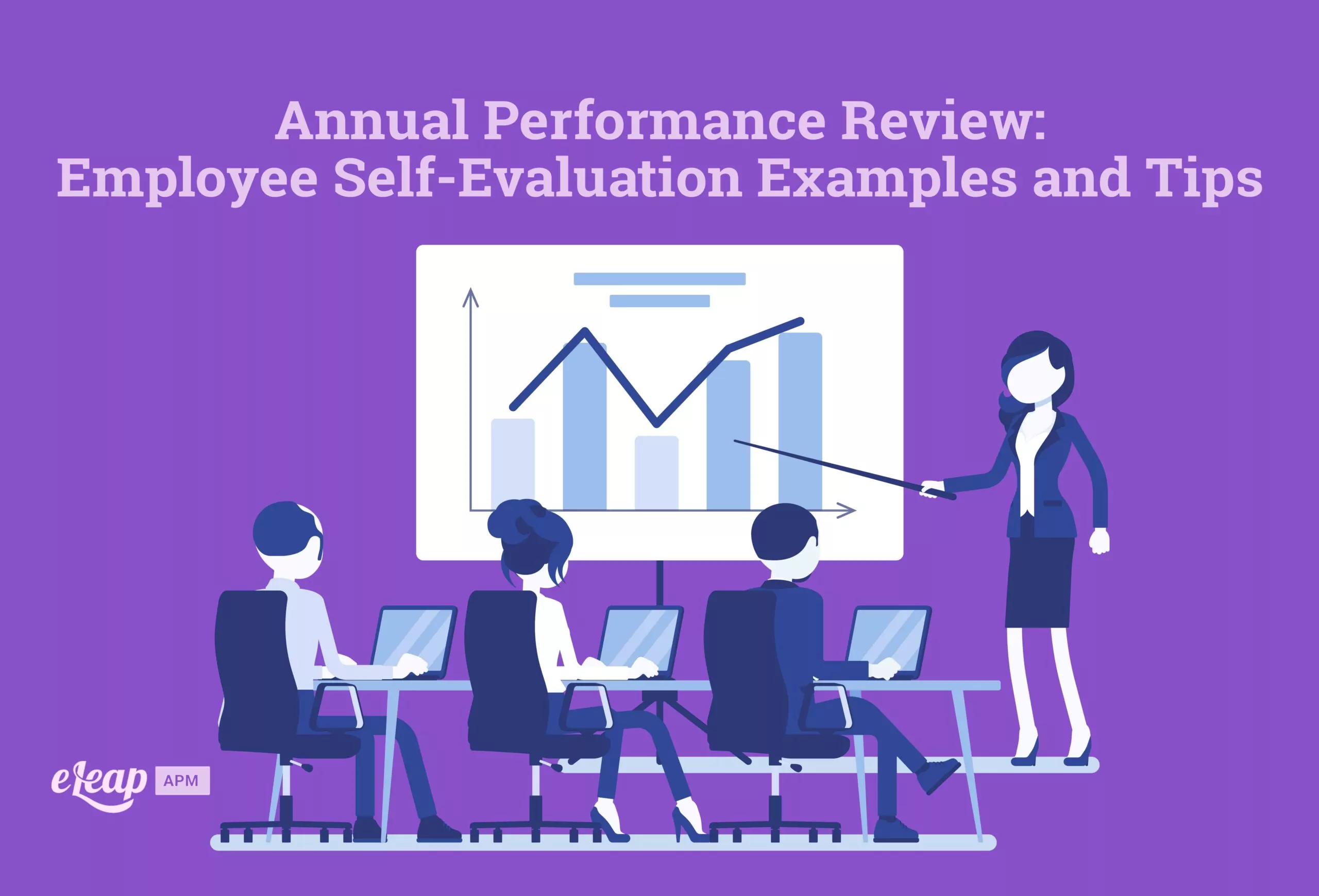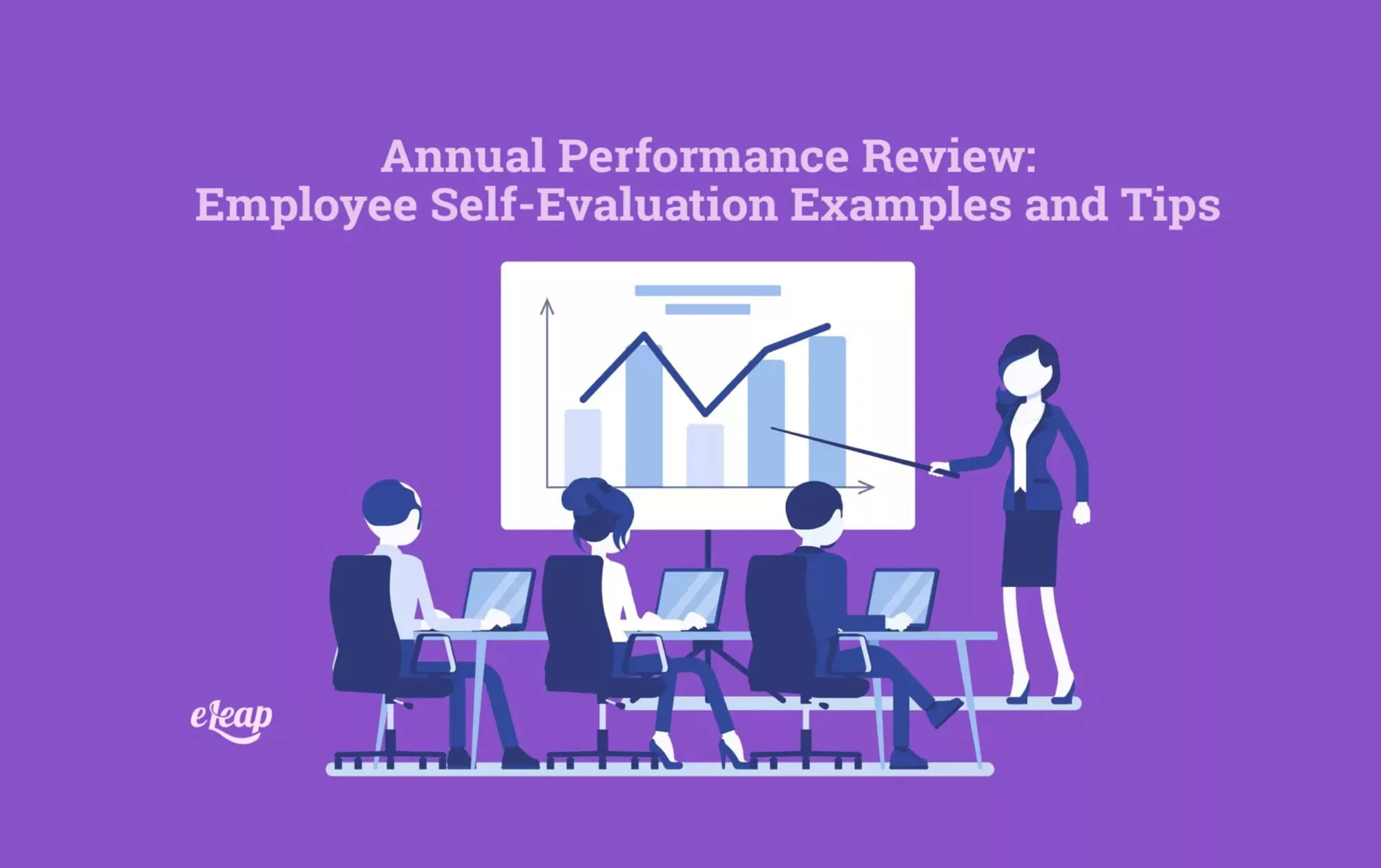Annual Performance Review: Employee Self-Evaluation Examples and Tips

Giving your employees ownership over their roles includes allowing them to perform a self-evaluation. Today’s employees enjoy feeling like they are accountable for their own career and their own success. They want more hands-off management that puts them in their role and allows them to flourish. The problem, however, is that by the time it gets around to what employees want, it’s already too late. Managers have made their analyses. They have written up the reviews. They have judged past performance and have no room for anything else. Explore how eLeaP’s Performance Management Platform can simplify evaluations, boost productivity, and drive measurable results.
Companies use a lot of tools to assist with performance management, including managing, evaluating, and improving employee performance and productivity. The issue, however, is that the strategy and process used for performance reviews and management are outdated and companies are often still focusing on the wrong parts of employee performance. This is a time to reflect on employee contributions and judge things honestly, not just a time to check boxes and approve pay raises.

While performance reviews are a large part of business decision-making, they aren’t done as well as they could be. Instead of stressing about the existing reviews or past performance, employees should be able to take a proactive approach to their own career development. This includes the use of self-evaluation tools that can help you demonstrate how valuable you are to the organization.
What Is a Self-Evaluation?
A self-evaluation is essentially a review of performance that an employee gives themselves. It could include a list of accomplishments, areas that you think you need to improve, and goals that you have for the future. Some companies have different options for self-evaluation. And you’ll find examples that include everything from scorecards and templated multiple-choice surveys to fill-in-the-blank style reviews that let people speak openly about their self-evaluation and address areas that could stand to be used as opportunities for growth.
Self-assessments like these come in all forms and styles. Some managers even invite employees to simply perform their own self-assessments using whatever metrics and format they prefer. This leaves a lot of room for employees to also show their ability to take charge and finish a project that is persuasive and beneficial to the company. After all, what’s more beneficial than telling them exactly where you’re falling short and where you are excelling, as well as which ways they can help foster further development?
It’s like giving the organization the answers to the test ahead of time. Managers can set goals and perform reviews for employees all day long and they won’t have nearly the impact of a proper self-evaluation when it is embraced and taken seriously.
Annual Performance Review Employee Self-Evaluation Examples
To help you better understand this process, we’ve collected some examples that can show you just what a good self-evaluation can look like. Instead of compiling an entire review with a single list of questions or comments, it’s sometimes easier to focus on specific categories that are going to be reviewed and the different ways that you can talk about them.
Annual performance review employee self-evaluation surveys generally include categories like:
- Communication/cooperation
- Achievements
- Teamwork
- Creativity/innovation
- Critical thinking/problem solving
- Adaptability/flexibility
Let’s take a closer look at each category and some examples of how a self-evaluation might look.
Communication
I have strong communication skills that allow me to interact with clients and identify the best approach to resolve their needs or address their concerns.
I have improved my communication by asking for help and feedback, practicing group presentations and virtual meetings, and communicating proactively to prevent miscommunications and project delays.
While I excel at teamwork, sometimes I struggle to communicate my ideas in writing, so I am going to practice using message boards and email more frequently to improve that skill.
Achievements
I have exceeded all of my KPIs (key performance indicators) for the year. Improving client retention and increasing our customer support presence both digitally and through traditional mediums.
I achieved team leader status due to my ability to lead a team and encourage collaboration with an open mind, helping to increase engagement with other employees and teams, as well.
I could improve my goal accomplishment by taking a more dedicated focus and meeting weekly with my managers to get a feel for how things are going and discuss milestones.
Teamwork
When teamwork projects arise, I am able to collaborate effectively and share responsibilities as long as someone else delegates the tasks.
I could improve my ability to delegate tasks by taking more control and working with my manager on time management and how to lead teams.
I have created a new model for teamwork and employee engagement that allows everyone to feel valued and have a direct contribution to the company’s growth.
Creativity and Innovation
I am always looking for creative solutions and have solved more than one client issue by suggesting new ideas that others may not have considered.
My manager encourages me to share my creative ideas by having weekly brainstorming sessions, which helps me get past the “status quo” and seek out more innovative solutions.
Sometimes, I struggle to balance creativity with following the rules of production. I’d like to talk to peers and other leaders to see how to maintain this balance and ensure that I am being challenged and accomplishing company goals in the best way possible.
Critical Thinking/Problem Solving
I display my problem-solving skills when I attack complex problems and work until I determine the root cause of the issue. My logic and critical thinking skills allow me to break down the issue and come up with an effective solution.
Thanks to my strong teamwork skills, I am also capable of delivering results with problem-solving, including when something I have done has been the problem.
I sometimes get so invested in a project that I forget to consider the potential risks or problems and therefore am not prepared for all the eventual outcomes. I want to improve this by being more thoughtful and logical in my work.
Adaptability
I am able to switch gears easily and change my focus to get things done when a new priority arises.
I struggle with flexibility because I like my routine and the things that I know. However, I would like to improve this by working to take small steps toward being more adaptable when last-minute changes arise.
When there are big business changes, I don’t worry about my role because I am capable of adapting and growing with the changes.
The Benefits of Self-Evaluations
Aside from this being an employee’s chance to show off their accomplishments, these tools can also be powerful in helping with several areas of the job. You will be able to create a full report of your current role, capabilities, achievements, goals, and more. You can also find areas of growth and show how you are delivering value to the company despite your shortcomings. You’ll be able to paint a clear picture of where you stand and what you want to contribute in the future.
Employees will be able to use self-evaluations to advocate for their positions, their needs, and the resources required to help them reach their goals. It will also give them time to prepare for that conversation with the manager. Sometimes, the formal sit-down performance review concept itself is intimidating to people. With a self-evaluation completed and ready to go. You’ll be ready to discuss all the performance topics that the manager brings up, as well as any others that you have in mind.
This allows you to help your manager out, too. While they’re doing their best to keep track of employees and their growth. They also have their own job to do and other goals to keep in mind. So they might not be paying attention to all the details all the time. Especially when reviews are done only once or twice a year, it’s not uncommon for leaders to forget or miss an employee’s growth moment. A self-evaluation gets you back at the front of their mind and lets them focus on your successes.
Tips for Success
No one is usually comfortable writing about themselves. However, it’s easier to do if you go into it with a plan. For starters, make sure that you offer specific examples of your work and accomplishments. Not only will this ensure that your manager can’t rebuff your self-evaluation, but it will allow you to take pride in what you do.
You’ll also want to make sure that you can back up your statements with metrics and proof. This helps negotiate for asks and ensures that you actually know how you’ve improved or how you’ve helped the business improve. Remember to keep tabs on your accomplishments throughout the year so that these self-evaluations are easier to complete when they do arise, and remember to always look at things in a positive light.
If you want a better performance review, why not start by giving yourself one? With these tips, self-evaluations can be a great way to boost your morale and help the company keep tabs on all that you do. eLeaP has powerful tools and resources to ensure you have success when it comes to reviews and self-evaluation.